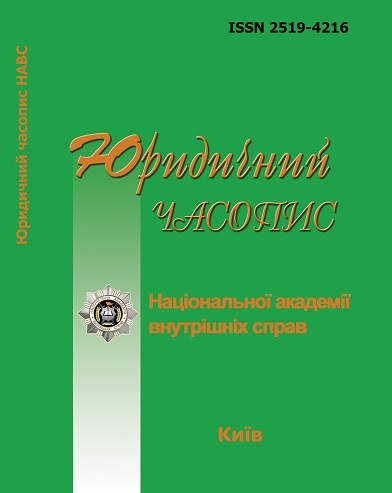International Legal Acts Concerning the Principles of the Citizenship and their Validity on the Temporarily Occupied Territory of Ukraine
Abstract
The article analyzes the international normative acts in which its external representation reflects the regulation of the principles of citizenship. The study is aimed at characterizing the legal acts concerning the international regulation of the principles of citizenship in order to improve the national legislation in the conditions of the occupation of part of the sovereign territory of Ukraine and possible further directions of research in this area.
Due to the occupation by the Russian Federation of part of the sovereign territory of Ukraine, where its citizens are located, the status of Ukrainian citizens residing in this territory also undergoes a certain transformation.
Therefore, there are a number of acute urgent issues of ensuring proper living conditions in the occupied territory of the Autonomous Republic of Crimea and the city of Sevastopol.
The purpose of the article was to conduct a study of the current state of international legal acts, which find its external representation of the regulation of the principles of citizenship, as an element of the right status. At the same time, our study has a theoretical focus on the characterization of legal acts of international regulation of the principles of citizenship in order to improve the national legislation, in the conditions of temporary occupation of part of the sovereign territory of Ukraine, and outlining possible areas for further analysis of the chosen problem in law science.
Having committed armed aggression against Ukraine, the Russian Federation has grossly violated its obligations as established by international acts.
Since the temporary occupation of parts of the territory of Ukraine and at present, the Russian Federation is forcing (automatically) granting its citizenship to persons who are citizens of Ukraine, accompanied by these cynical and unlawful requirements regarding the change of Ukrainian citizenship in Russian, which leads to massive violations of the rights of Ukrainian citizens.
Summing up, in view of the above, and given that one of the priority tasks of the Ukrainian people in modern conditions is as soon as possible complete restoration of the territorial integrity of the state, which will lead to the political and legal, and thus practical solution of important issues concerning the full protection of the citizens of Ukraine who are now in the occupied territory, the possibilities to fully exercise their constitutional rights and freedoms, the author notes. The enshrined principles of citizenship in international legal acts are imperative in nature, and therefore the Russian Federation in the temporarily occupied territory of Ukraine violates the relevant international acts concerning the citizens of Ukraine. There should be a policy of constant appeal to the international institutions of which Ukraine is a party, with appeals for the peaceful return of its temporarily occupied territories and the requirements for approving the relevant international resolutions in this area. It is necessary to create effective state mechanisms for the protection of Ukrainian citizens staying in the temporarily occupied territory, taking into account the principles of citizenship, enshrined in international legal acts. To actively conduct information and legal policy on the possibility of appeals of citizens of Ukraine with claims to the Russian Federation.
Downloads
Abstract views: 187 PDF Downloads: 557
Copyright (c) 2018 Law Magazine of the National Academy of Internal Affairs

This work is licensed under a Creative Commons Attribution-NonCommercial-NoDerivatives 4.0 International License.
- Authors reserve the right to authorship of their own work and transfer to the magazine the right of the first publication of this work under the terms of the Creative Commons Attribution License, which allows other persons to freely distribute published work with mandatory reference to authors of the original work and the first publication of an article in this magazine.
- Authors have the right to enter into separate additional agreements on non-exclusive dissemination of the work in the form in which it was published in the journal (for example, to post an article in the institution's repository or to publish as part of a monograph), provided that the link to the first publication of the work in this journal is maintained.
- The journal's policy allows and encourages the posting of articles by authors on the Internet (for example, in electronic storehouses of institutions or on personal websites), both before the submission of this manuscript to the editorial office and during its editorial processing, as this contributes to the creation of a productive scientific discussion and positively affects the efficiency and dynamics of citing the published work.




